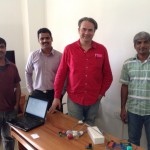Syam Madanapalli , Co- Founded iRam Technologies along with Satyanarayana Divi, , Idris T Vasi and Sudhakar Kanuri. All of them had worked with each other in their previous jobs. They founded iRam to produce IoT products when the IoT acronym itself was not coined. Syam had lots of experience working on the Internet Standards at IETF (Internet Engineering Task Force – the body that makes the Internet working better). They wanted to evolve the Internet to support the connectivity for non-living things like appliances, devices, objects etc. (the things). They were sure that this will also grow along with the growth of the internet. They started this from the mid of 2010. They create the most advanced Smart Electrical Switches, the cloud and mobiles for Smart homes and Smart Street Lighting and also extend this technology to other verticals like healthcare, appliances, smart villages and cities, retail, transport etc.
They were very passionate to doing something for India and hence they took this up as the main market. They also chose Africa because they were sure that such technologies will be accepted very fast in a underserved developing market unlike the competition that they would face in the developed market. Syam recollects incidents in certain parts of India where the electricity department government officials will not even be allowed inside some houses to take meter reading and found a huge potential of selling this to the utilities. They went to the utilities, spoke to them and confirmed that this problem was real and realized that they were in business. They spent a good amount of time, invested in R&D and developed the Sensor, Cloud and the mobile apps.. They did a clustered metering solution where the work was done on the pole itself from where the meter readings can be taken from a remote location. They demonstrated quite a bit with multiple large government utilities both in India as well as in Africa through their partners, but found that the interest shown during the demo weans all the time and the prospects always goes into hiding. They began chasing down the people and after a lot of struggle, they found out that the government authorities were not willing to take a risk with a small and a new company and the financials of iRam was also very low that they were not eligible to participate in the bidding process.
This bought the founding team together on what to do next. They had a wonderful product and knew that this will benefit the market but the bureaucracy aspect was not working in their favor. At this time, a company in the US approached them for a partnership and they began licensing their technology to that US company which gave them the capital to survive. They began analyzing other geographies for better penetration but realized that the competition was too high. They also explored partnering with large companies who are eligible for large contracts in government utilities but those terms put forth by the large players were not conducive to them. They began thinking of other verticals and found out that smart homes owned by the rich people and big apartments were underserved and began re-configuring their base technology to suit this product and pivoted.
They went to the building contractors and began talking to them and all the builders nodded positively about the need of home automation but stated a couple of objections. One was that the expense required to automate was ay to high and a 10 lakh budget for this alone was affordable only by people who spend more than INR 2 crores and above and this also required planning way ahead along with the blue print of the house to accommodate the automation but the automation may evolve in two years (the time taken to build a luxury apartment and hence the planning may not be valid any longer). The cost of the skilled labor to implement competing complex products also adds to the cost. They also understood what the builders customers (the home owners) wanted. They worked on these facts that came out of the customer discovery and worked out on the Internet Architecture for smart homes. As a start up, they can only build a single product, and found that the electrical switch is the most used control in homes and offices, and built a most advanced electrical switch that seamlessly connects to the Internet. Their architecture and ease of usability makes the solution low cost while provide the advanced Technology and features, and went to the builders to demonstrate the base product.
Since one of the founders friend was well connected with the construction industry, they got the meetings easily and demonstrated the product. The first customer (builder) liked the idea but said that he will give a big deal only if the product worked for six months and they installed one product (paid) and waited for six months for it to prove. Simultaneously, they also began reaching out to other buyers and did the trials with them. Since the products lived to the claims, they began getting bigger deals. The founders were selling using a combination of exhibitions, channel partners, good coverage in media and cold calling.
Syam’s Advice to startup founders – One needs to build something that is very independent of others yet should fit into the ecosystem and collaboration with the ecosystem players is the key for sustainable business. E.g. If you can serve one type of customer, while collaborating with the ecosystem players you might have a reach of 2^n customers.
iRam (http://www.iramtech.com) currently has lots of partners and consultants in different geographic locations. They have around 16 people working from various locations. They have raised funding from angel investors Suresh Posani and Prakash Yarlagadda. They have wont the India Innovation Initiative – i3, 2013 the Most Innovative (First Prize) Product by Young Indians – promoted by Agilent, Department of Science and Technology (DST) – Government of India, and Confederation of Indian Industries (CII). They were selected for Nasscom Emerge 50 2013 and just won the IESA Technovation Award for the Most innovative product that made in India. They have also filed for two patents. iRam is currently looking at licensing the IoT Technology to various verticals markets.






